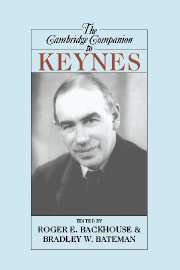Book contents
- Frontmatter
- 1 A cunning purchase: the life and work of Maynard Keynes
- 2 The Keynesian revolution
- 3 Keynes and the birth of modern macroeconomics
- 4 Keynes as a Marshallian
- 5 Doctor Keynes: economic theory in a diagnostic science
- 6 Keynes and British economic policy
- 7 Keynes and Cambridge
- 8 Keynes and his correspondence
- 9 Keynes and philosophers
- 10 Keynes’s political philosophy
- 11 Keynes and probability
- 12 The art of an ethical life: Keynes and Bloomsbury
- 13 Keynes and ethics
- 14 Keynes between modernism and post-modernism
- 15 Keynes and Keynesianism
- Bibliography
- Index
9 - Keynes and philosophers
Published online by Cambridge University Press: 28 November 2006
- Frontmatter
- 1 A cunning purchase: the life and work of Maynard Keynes
- 2 The Keynesian revolution
- 3 Keynes and the birth of modern macroeconomics
- 4 Keynes as a Marshallian
- 5 Doctor Keynes: economic theory in a diagnostic science
- 6 Keynes and British economic policy
- 7 Keynes and Cambridge
- 8 Keynes and his correspondence
- 9 Keynes and philosophers
- 10 Keynes’s political philosophy
- 11 Keynes and probability
- 12 The art of an ethical life: Keynes and Bloomsbury
- 13 Keynes and ethics
- 14 Keynes between modernism and post-modernism
- 15 Keynes and Keynesianism
- Bibliography
- Index
Summary
CAMBRIDGE PHILOSOPHERS AND EARLY BELIEFS
In 1903, Cambridge saw the launching of three seminal works that would exercise a powerful impact on twentieth-century philosophy: G. E. Moore's Principia Ethica and Refutation of Idealism, and Bertrand Russell's Principles of Mathematics. It was natural for a sophisticated and ambitious freshman in mathematics, the son of a lecturer in moral science, to plunge into animated philosophical debates. Keynes attended Moore's lectures on ethics and McTaggart's on metaphysics, also becoming an active member of the Apostles Society, of which the three elder philosophers were leading figures. While still an undergraduate student, Keynes wrote papers on ethics, aesthetics and metaphysics and in 1907 completed the fellowship dissertation, later expanded into A Treatise on Probability.
It is generally agreed that Principia Ethica was ‘the book’ the young Keynes ‘grew up under’, as he himself recollected in the autobiographical Memoir read in 1938 at a meeting of Bloomsbury, the London group that was heir to the Cambridge Apostles. On that occasion, he gave a lively and passionate picture of the Moorian dispensation of love, beauty and truth, conceived as Platonic ideas and representing the greatest incarnation of the good, embodied in subjective mental states of personal affection and aesthetic enjoyment. This ‘religion’, Keynes said, fitted ‘the undisturbed individualism which was the extraordinary achievement of the early Edwardian days’ (JMK X: 444).
- Type
- Chapter
- Information
- The Cambridge Companion to Keynes , pp. 160 - 179Publisher: Cambridge University PressPrint publication year: 2006
- 14
- Cited by



